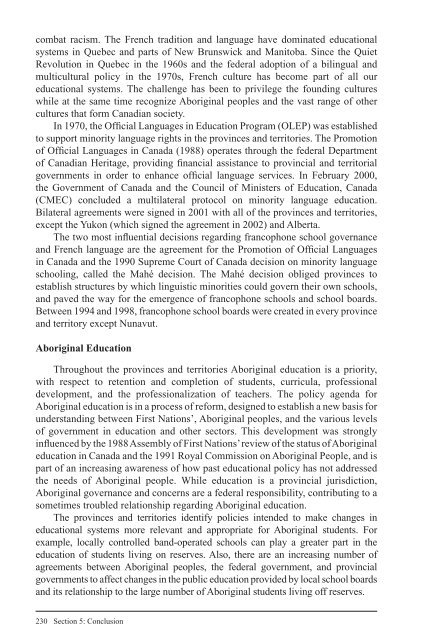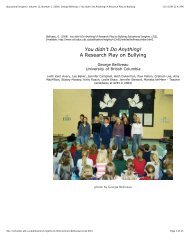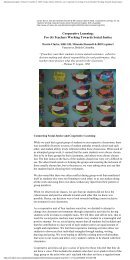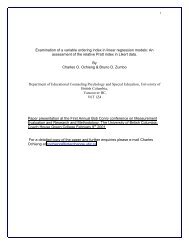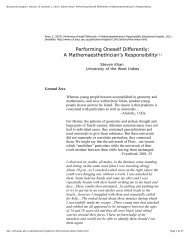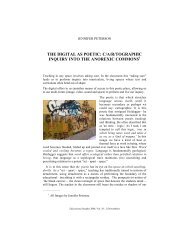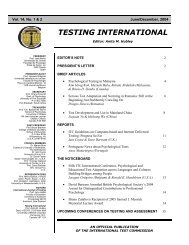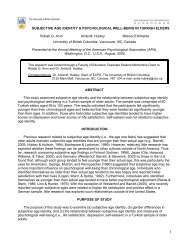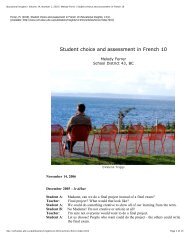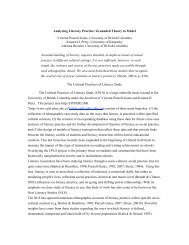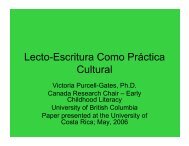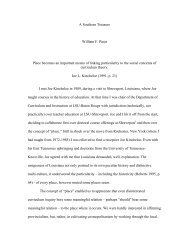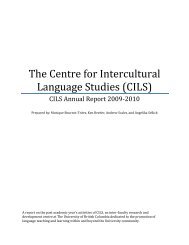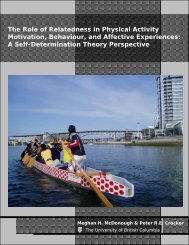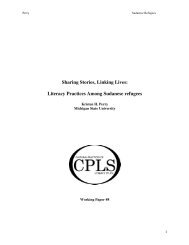The evolution of professionalism - Centre for Policy Studies in ...
The evolution of professionalism - Centre for Policy Studies in ...
The evolution of professionalism - Centre for Policy Studies in ...
Create successful ePaper yourself
Turn your PDF publications into a flip-book with our unique Google optimized e-Paper software.
combat racism. <strong>The</strong> French tradition and language have dom<strong>in</strong>ated educational<br />
systems <strong>in</strong> Quebec and parts <strong>of</strong> New Brunswick and Manitoba. S<strong>in</strong>ce the Quiet<br />
R<strong>evolution</strong> <strong>in</strong> Quebec <strong>in</strong> the 1960s and the federal adoption <strong>of</strong> a bil<strong>in</strong>gual and<br />
multicultural policy <strong>in</strong> the 1970s, French culture has become part <strong>of</strong> all our<br />
educational systems. <strong>The</strong> challenge has been to privilege the found<strong>in</strong>g cultures<br />
while at the same time recognize Aborig<strong>in</strong>al peoples and the vast range <strong>of</strong> other<br />
cultures that <strong>for</strong>m Canadian society.<br />
In 1970, the Offi cial Languages <strong>in</strong> Education Program (OLEP) was established<br />
to support m<strong>in</strong>ority language rights <strong>in</strong> the prov<strong>in</strong>ces and territories. <strong>The</strong> Promotion<br />
<strong>of</strong> Offi cial Languages <strong>in</strong> Canada (1988) operates through the federal Department<br />
<strong>of</strong> Canadian Heritage, provid<strong>in</strong>g fi nancial assistance to prov<strong>in</strong>cial and territorial<br />
governments <strong>in</strong> order to enhance <strong>of</strong>fi cial language services. In February 2000,<br />
the Government <strong>of</strong> Canada and the Council <strong>of</strong> M<strong>in</strong>isters <strong>of</strong> Education, Canada<br />
(CMEC) concluded a multilateral protocol on m<strong>in</strong>ority language education.<br />
Bilateral agreements were signed <strong>in</strong> 2001 with all <strong>of</strong> the prov<strong>in</strong>ces and territories,<br />
except the Yukon (which signed the agreement <strong>in</strong> 2002) and Alberta.<br />
<strong>The</strong> two most <strong>in</strong>fl uential decisions regard<strong>in</strong>g francophone school governance<br />
and French language are the agreement <strong>for</strong> the Promotion <strong>of</strong> Offi cial Languages<br />
<strong>in</strong> Canada and the 1990 Supreme Court <strong>of</strong> Canada decision on m<strong>in</strong>ority language<br />
school<strong>in</strong>g, called the Mahé decision. <strong>The</strong> Mahé decision obliged prov<strong>in</strong>ces to<br />
establish structures by which l<strong>in</strong>guistic m<strong>in</strong>orities could govern their own schools,<br />
and paved the way <strong>for</strong> the emergence <strong>of</strong> francophone schools and school boards.<br />
Between 1994 and 1998, francophone school boards were created <strong>in</strong> every prov<strong>in</strong>ce<br />
and territory except Nunavut.<br />
Aborig<strong>in</strong>al Education<br />
Throughout the prov<strong>in</strong>ces and territories Aborig<strong>in</strong>al education is a priority,<br />
with respect to retention and completion <strong>of</strong> students, curricula, pr<strong>of</strong>essional<br />
development, and the pr<strong>of</strong>essionalization <strong>of</strong> teachers. <strong>The</strong> policy agenda <strong>for</strong><br />
Aborig<strong>in</strong>al education is <strong>in</strong> a process <strong>of</strong> re<strong>for</strong>m, designed to establish a new basis <strong>for</strong><br />
understand<strong>in</strong>g between First Nations’, Aborig<strong>in</strong>al peoples, and the various levels<br />
<strong>of</strong> government <strong>in</strong> education and other sectors. This development was strongly<br />
<strong>in</strong>fl uenced by the 1988 Assembly <strong>of</strong> First Nations’ review <strong>of</strong> the status <strong>of</strong> Aborig<strong>in</strong>al<br />
education <strong>in</strong> Canada and the 1991 Royal Commission on Aborig<strong>in</strong>al People, and is<br />
part <strong>of</strong> an <strong>in</strong>creas<strong>in</strong>g awareness <strong>of</strong> how past educational policy has not addressed<br />
the needs <strong>of</strong> Aborig<strong>in</strong>al people. While education is a prov<strong>in</strong>cial jurisdiction,<br />
Aborig<strong>in</strong>al governance and concerns are a federal responsibility, contribut<strong>in</strong>g to a<br />
sometimes troubled relationship regard<strong>in</strong>g Aborig<strong>in</strong>al education.<br />
<strong>The</strong> prov<strong>in</strong>ces and territories identify policies <strong>in</strong>tended to make changes <strong>in</strong><br />
educational systems more relevant and appropriate <strong>for</strong> Aborig<strong>in</strong>al students. For<br />
example, locally controlled band-operated schools can play a greater part <strong>in</strong> the<br />
education <strong>of</strong> students liv<strong>in</strong>g on reserves. Also, there are an <strong>in</strong>creas<strong>in</strong>g number <strong>of</strong><br />
agreements between Aborig<strong>in</strong>al peoples, the federal government, and prov<strong>in</strong>cial<br />
governments to affect changes <strong>in</strong> the public education provided by local school boards<br />
and its relationship to the large number <strong>of</strong> Aborig<strong>in</strong>al students liv<strong>in</strong>g <strong>of</strong>f reserves.<br />
230 Section 5: Conclusion


